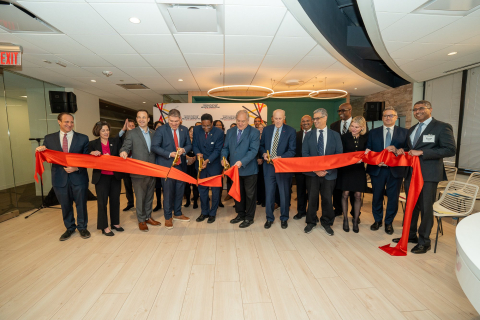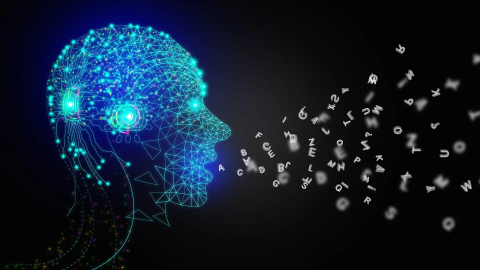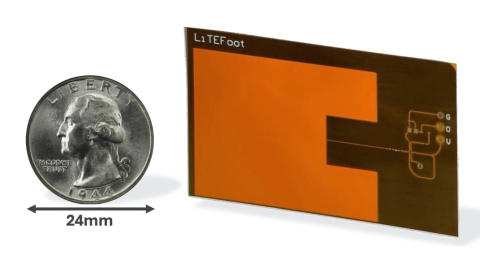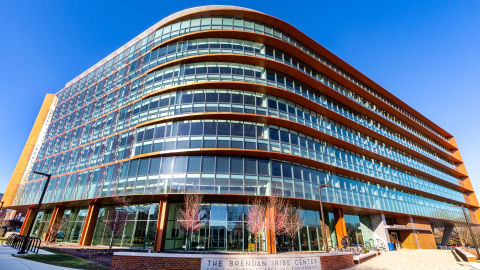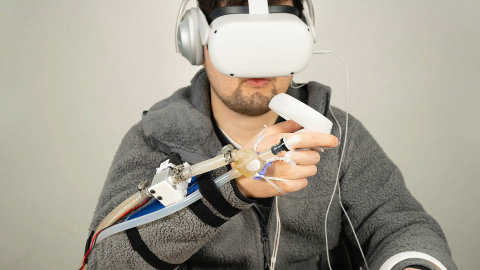Recent News & Accomplishments
2024
The institute led by Adam Porter welcomed dozens of leaders to its headquarters in North Bethesda for a ribbon cutting and announced new partnerships with industry and the federal government.
Uncovering bias in AI models used in medical diagnosis. Identifying patients with potentially life-threatening antibiotic-resistant infections. Predicting the spread of disease with advanced computing. These are just a few of the advances in medical care in the works at the University of Maryland Institute for Health Computing (UM-IHC), which uses high-performance computing and artificial intelligence to benefit public health in ways unimaginable just a few years ago. The institute welcomed dozens of leaders from Montgomery County, state government, life science companies and federal agencies... read more
Ph.D. student Phillip Pope merges quantum chemistry and machine learning to combat climate change and improve energy efficiency.
At the crossroads of quantum chemistry and machine learning, researchers are advancing novel discoveries in materials science to improve energy efficiency—new knowledge that could revolutionize how we tackle global challenges like sustainability and energy production. Phillip Pope, a sixth-year doctoral student in computer science at the University of Maryland, is active in this area, combining his skills in machine learning with a strong commitment to combating the climate crisis. A native of St. Petersburg, Florida, Pope has seen firsthand the devastating impacts of climate change. “My... read more
Starting Spring 2025, the Grant Family Outstanding Achievement Undergraduate Student Award will recognize graduating seniors excelling in both fields.
The University of Maryland will launch the Grant Family Outstanding Achievement Undergraduate Student Award in Computer Science and Mathematics in Spring 2025 to honor exceptional graduating seniors excelling in both fields. Established by computer science Adjunct Professor John Grant , the award recognizes undergraduate students pursuing double majors in these interconnected disciplines. Grant has been a faculty member in both mathematics and computer science departments for over 50 years. All majors conferred by the Department of Computer Science are eligible for the award, which will be... read more
Furong Huang discusses the impact of AI during The New York Academy of Sciences’ 2025 Machine Learning Symposium.
The New York Academy of Sciences (the Academy) hosted the 15th Annual Machine Learning Symposium. This year’s event, sponsored by Google Research and Cubist Systematic Strategies, included keynote addresses from leading experts, spotlight talks from graduate students and tech entrepreneurs, and opportunities for networking. Exploring and Mitigating Safety Risks in Large Language Models and Generative AI Pin-Yu Chen, PhD, a principal research scientist at IBM Research, opened the symposium with a keynote lecture about his work examining adversarial machine learning of neural networks for... read more
Team found the mnemonics we prefer may not match those that actually help.
What is melancholy, really? Consider a hardworking collie after a day of herding sheep. She’ll be hungry, but all she has to eat is a melon. The pup will be sad—melancholy, even. Whether it’s memorizing vocabulary for a test or learning new foreign language phrases, we’ve all used such “keyword mnemonics,” which help us to learn and remember new terms or phrases by associating them with something that’s easy to recall. But crafting mnemonics can be almost as hard as memorization. What if there was a way to make using this classic technique easier? Enter SMART—an AI-driven keyword mnemonic... read more
Nakul Garg and Aritrik Ghosh’s ultra-low-power tracking system, LiTEfoot, earns acclaim for its innovation in supply chain localization.
University of Maryland Department of Computer Science graduate students Nakul Garg and Aritrik Ghosh presented their research at the 22nd ACM Conference on Embedded Networked Sensor Systems (SenSys) held from November 4-7, 2024, in Hangzhou, China. Their work received the Best Poster Runner-Up Award, highlighting innovations in networked sensing and actuation systems. Garg and Ghosh, advised by computer science Assistant Professor Nirupam Roy, developed LiTEfoot, a low-power localization system designed for the long-term tracking of small assets across global supply chains. By leveraging... read more
Planned faculty expansion among largest in university history.
The University of Maryland on Thursday announced one of the largest faculty expansions in its history, with plans to hire 40 faculty in fields across its colleges and schools to help advance the next generation of artificial intelligence (AI) technology, education and leaders. The new faculty members will support the Artificial Intelligence Interdisciplinary Institute at Maryland (AIM), a collaborative hub launched last spring to conduct research, offer innovative and experiential learning opportunities for students and focus on responsible and ethical AI technology to advance the public good... read more
The AI detection tool "Binoculars" uses dual-model analysis to identify content generated by artificial intelligence.
As AI-generated content spreads across digital platforms, distinguishing it from human-written text is becoming an urgent challenge. Researchers at the University of Maryland have responded with “ Binoculars ,” a tool designed to meet this demand through innovative detection methods. Abhimanyu Hans , a graduate student in the Department of Computer Science, is the lead researcher behind the tool. Tom Goldstein , the Volpi-Cupal Endowed Professor of Computer Science with an appointment in the University of Maryland Institute for Advanced Computer Studies (UMIACS) and Avi Schwarzschild , who... read more
Princeton Review and Entrepreneur magazine rank UMD No. 7 overall and No. 5 among public universities.
The University of Maryland again stands among the best in the nation at promoting student entrepreneurship, according to 2025 rankings released today by The Princeton Review and Entrepreneur magazine. UMD placed No. 7 across all institutions, No. 5 among public universities, No. 17 for graduate entrepreneurship education and No. 1 in the mid-Atlantic for both undergraduate and graduate programs. This marks Maryland’s 10th straight year in the top 10. “Being a mainstay in the Top 10 for an entire decade is a testament to our unique approach and commitment to empower all 50,000 of our students... read more
‘Sensational’ new gaming tech could someday aid blind users.
Increasingly sophisticated computer graphics and spatial 3D sound are combining to make the virtual world of games bigger, badder and more beautiful than ever. And beyond sight and sound, haptic technology can create a sense of touch—including vibrations in your gaming chair from an explosion, or difficulty turning the wheel as you steer your F1 racecar through a turn because of g-forces. While all this typically relies on force feedback using mechanical devices, University of Maryland researchers are now offering a new take that delivers lifelike haptic experiences with controlled water jets... read more
